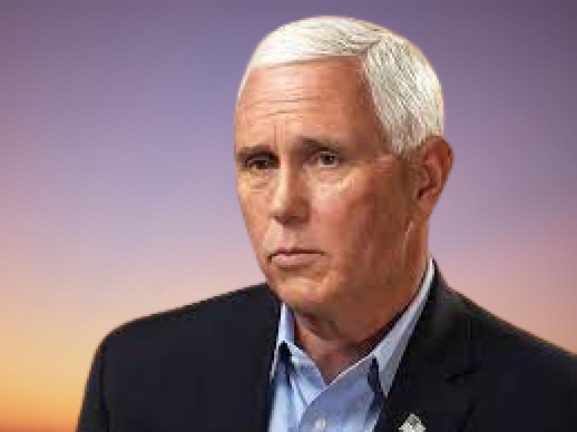Mike Pence Faces Skepticism: On the campaign trail, former Vice President Mike Pence finds himself in a position where he must address skepticism and criticism regarding his actions on January 6, 2021. This date marks a pivotal moment in American history when the Capitol was stormed by a pro-Trump mob in an attempt to overturn the 2020 election results. In Iowa, a voter directly confronted Pence, questioning whether he ever second-guesses his decision to certify Joe Biden as the winner of the election. This incident sheds light on the ongoing tension between Pence’s loyalty to Trump and his commitment to upholding democratic principles.
Accusations of Unfairly Handing Over the Election
At a crowded Pizza Ranch restaurant in Sioux City, Iowa, an Iowa voter raised concerns about Pence’s role in certifying the election results. The woman accused him of unfairly “changing history” by refusing to send the 2020 election results back to the states for a recount. She claimed that Pence had a constitutional right to exercise that option.
Pence’s Stance and Refusal to Yield to Pressure
Despite immense pressure from President Donald Trump and his loyal supporters, Pence stood firm and certified the election results. He adamantly refused to succumb to Trump’s baseless conspiracy theories that alleged election fraud had taken place. Pence’s decision was based on his allegiance to the Constitution and his belief in the democratic process.
Leaning into the Break with Trump
Pence has strategically positioned his break with Trump as a key differentiating point in his political journey. When he launched his campaign for the GOP presidential nomination, Pence took the opportunity to criticize his former boss. He claimed that Trump had abandoned conservative principles and disregarded the Constitution. By emphasizing his refusal to yield to Trump’s demands on January 6, Pence aims to present himself as a principled leader who prioritizes the integrity of the democratic system.
The Risk of Alienating the Trump Base
While Pence’s approach allows him to establish his own distinct political path, it also carries the risk of alienating a significant portion of the Republican base that remains loyal to Trump. Many Trump supporters continue to view Pence’s actions as a betrayal. They believe that he should have supported Trump’s claims of election fraud and taken a more active role in challenging the election results. Pence’s decision to certify the election, while aligned with constitutional principles, has created a divide within the party.
Clarifying the Constitutional Framework
During the confrontation at the Pizza Ranch, Pence took the opportunity to clarify the constitutional framework surrounding the certification of election results. He explained that the Constitution does not grant the vice president or any other individual the authority to reject or return votes to the states. Pence emphasized that he followed the Constitution faithfully and maintained that no vice president in American history had ever asserted the authority that some believed he possessed.
Disagreeing with Trump’s Perception of Authority
Pence made it clear that he disagrees with Trump’s perception of his authority on January 6. He firmly stated that President Trump was wrong in asserting that Pence had the power to reject or return votes. This public disagreement demonstrates Pence’s willingness to distance himself from Trump’s narrative and assert his own understanding of the constitutional limitations of his role.
Addressing Inaccurate Messaging
Following the incident at the Pizza Ranch, Pence welcomed the opportunity to address the inaccurate messaging propagated by Trump surrounding the certification of the election results. During an interview with NBC News, he highlighted the importance of discussing the facts and clarifying any misunderstandings. Pence reiterated his commitment to upholding his oath to the Constitution, emphasizing that if he were to become president, Americans could count on him to faithfully fulfill that duty.
Also Read:
Campaigning Challenges and Future Prospects
Despite lagging significantly in the polls, Pence remains undeterred in his campaign efforts. A recent NBC News poll showed Trump with a commanding lead over other potential candidates. Nevertheless, Pence continues to traverse the campaign trail, engaging with voters and conveying his message.
Pence’s choice to kick off his presidential campaign in Iowa holds strategic significance. Iowa’s caucuses are the first in the GOP presidential primary calendar, making it a crucial state to establish a strong foundation of support. Pence’s background as the former governor and congressman of nearby Indiana adds familiarity and resonance to his appeal among Iowa’s active conservative evangelical community. Throughout his career, Pence has consistently taken conservative positions on social issues, aligning himself with the values and beliefs of the state’s conservative base.
However, Pence faces a challenging balancing act. While he attempts to differentiate himself from Trump and establish his own political identity, he must also be mindful of the significant portion of the GOP base that remains loyal to the former president. Striking the right chord with both factions of the party is essential for Pence’s campaign success.
conclusion of Mike Pence Faces Skepticism
Mike Pence finds himself navigating the complex landscape of skepticism and criticism regarding his actions on January 6. As he confronts questions about his decision to certify Joe Biden as the winner of the 2020 election, Pence emphasizes his commitment to the Constitution and his refusal to yield to baseless conspiracy theories. By distinguishing himself from Trump, Pence seeks to carve out his own political path, even if it risks alienating a portion of the Republican base. As the campaign progresses, Pence faces challenges but remains determined to make his mark in the race for the GOP presidential nomination.
Our Reader’s Queries
What did Mike Pence study in college?
Pence completed his high school education at Columbus North High School in 1977. He obtained a Bachelor of Arts in history from Hanover College in 1981, followed by a Juris Doctor from the Robert H. McKinney School of Law at Indiana UniversityPurdue University Indianapolis in Indianapolis in 1986.

